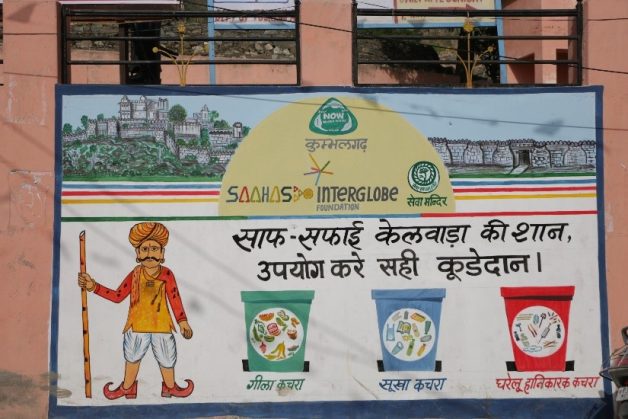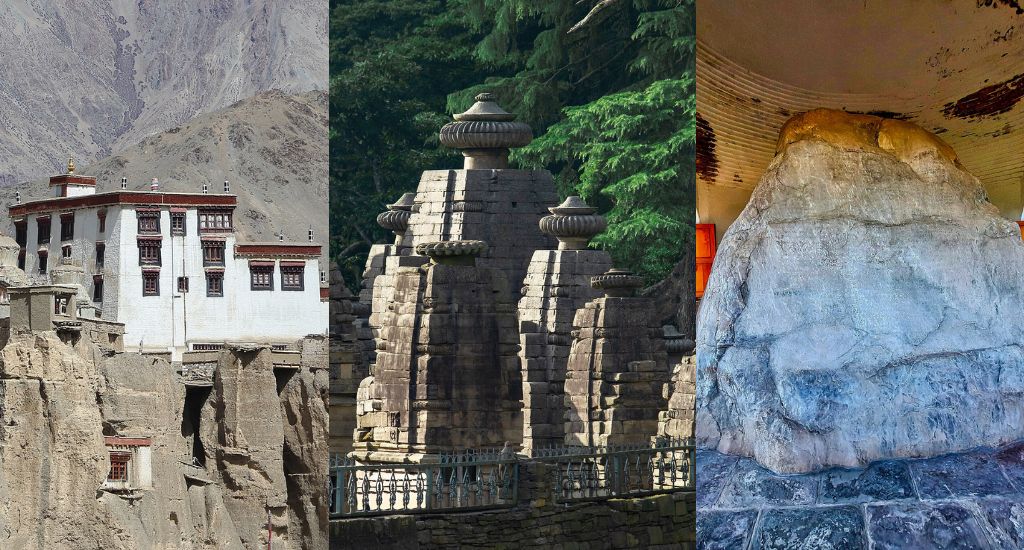Kelwara is a village in Kumbhalgarh tehsil of Rajsamand district, Rajasthan. Kelwara is located about 80 km from Udaipur city, and has more than 900 families residing in it. Quite close to the famous Kumbalgarh Fort, a World Heritage site and a tourist destination, Kelwara serves as the market center for many surrounding villages.
Like most places and small towns, Kelwara had problems dealing with municipal waste. Waste lay scattered, streets were not cleaned regularly, and mixed waste was being dumped in open plots and streams.
The drains were blocked with garbage, which hampered the flow of stormwater during rains. “The drains in the main market always posed a problem. We tried so many times to get it repaired through the panchayat but every year during rains, they were damaged,” said Kishan Paliwal, a resident and youth leader.
Every month, waste generated in Kelwara was more 2,000 kg, with plastic waste and newspaper accounting for 527 and 582 kg respectively. Plastic bottles and paper tea cups, each of 114 kg formed part of the municipal waste. Card board accounted for 198 kg, glass for 219 kg; other waste made up the rest.
The panchayat faced difficulties in making the monthly payment of Rs 800, to the workers it had appointed to clean the streets. An initiative started in 2018 involving the community has been improving waste management in Kelwara.
Mounting waste problem
Seva Mandir has been working in Kumbhalgarh for more than 20 years on issues such as sanitation, water, self-governance, education and nutrition. While working with communities in Kelwara and nearby villages, the issue of increasing waste kept coming up.

Seva Mandir took up the initiative to make Kelwara a No Open Waste (NOW) zone. With financial support from InterGlobe Foundation, a development organization, and technical support from Saahas, a waste management consultancy, it started the initiative in 2018. It was decided to involve the community for better results.
Kelwara’s commercial center is a long stretch. But taking various factors into consideration, it was decided to start work in a 3 km stretch that the villagers generally refer to as the main market. The market association, which is an association of all shop owners, restaurants and hotels in the stretch, was roped in.
Community institution
A community institution called Kelwara Vikas Samiti, meaning Kelwara Development Institution, was formed for the purpose of waste management. The seven members in the samiti were elected after multiple village meetings, for a period of three years. The members are from the market association, community, Seva Mandir, aarogya mitras or the cleaning crew members, and the panchayat.
Through extensive community awareness programs, 340 shops, homes, offices, hotels, etc. along the road were motivated and trained to segregate dry and wet waste at the source. Saahas trained aaogya mitras, samiti members, and project staff in sorting and disposal of waste. Saahas arranged for exposure visits too.
The samiti not only liaises with government and individual donors to keep the process running but also conducts regular meetings with community on segregation of waste and user fee collection. “Waste is our problem and now we know how to take responsibility for it,” said Niranjan Asawa, president of Kelwara Vikas Samiti.
Sidelined cleaners
The crew in the waste collection system is the most important and often ignored stakeholders of the waste management process. The crew consists of cleaners who clean the streets and drains, and collectors who go with a vehicle and collect dry and wet waste from the shops. The sorting is done by both.
Like in many other places, most of them have been traditionally involved in cleaning work. They not only lacked motivation and dignity of work, but their unequal status in the social structure made them reluctant to take ownership of the process.

Less payment and unavailability of necessary tools to collect and segregate waste was also a challenge. As part of the new community initiative, with contributions from InterGlobe and the panchayat, the aarogya mitras’ payment has been increased to Rs 2,000 per month.
“I was not excited in the beginning since it was just another cleaning work. But slowly I see people in the market recognizing me, offering tea and making conversation about my work,” said Kesar Bai, one of the aarogya mitras.
Managing waste
Repair and construction of three drains located in the main market area was done as part of the new initiative. A solid waste management unit has been constructed in Kelwara, in the land allocated by panchayat for ensuring proper waste management.
Aarogya mitras bring the collected waste to the unit and sort it. Collected wet waste is sorted into two categories of compostable and non-compostable waste. Compostable waste is kept in ventilated containers for decomposing, while non-compostable waste is stored as reject waste.
Dry waste is sorted into three categories. The items that can be recycled are sent to the local kabadi walas or small traders dealing with recyclable waste. The non-recyclables are stored for some time and then sent for further processing. The rejects are stored for disposal in a landfill.
User fee collection
Change in behavior of handling waste at the point of generation, i.e., households, shops, hotels, etc. was the biggest observed in the community over two years. However, collection of user fee remains a challenge.
Kailash Chandra Gameti, appointed by Seva Mandir to drive the vehicle to collect the waste, maintains data on the waste collected. In the last week of a month Gameti along with an aarogya mitra – also referred to as swachta karmi – goes on a mission to collect user fee.
User fee is one of the reliable sources of revenue. A monthly fee of Rs 30 is fixed for shops that generate mostly dry waste and Rs 50 for the ones that generate wet waste. Gameti who also supervises the aarogya mitras’ work, finds user fee collection his toughest task.

“Every shopkeeper who refuses to pay comes up with a different excuse. It, hence, becomes a task to engage in a conversation with each one of them as they all have different complaints and it seems even a bigger task to convince them,” said Gameti.
Some of them disappear leaving their children behind the counter. They parrot what they are taught to say, asking Gameti and the cleaner to come the next day since the parent is not there. It is the most common tunnel of escape that the shop owners resort to. “Following up with these people is tricky. They don’t deny or complain. They just procrastinate as long as they can,” said Gameti.
Improving the model
Solid waste is a challenge in all places, be it urban or rural. In recent years, discussion and action on proper collection, handling, and disposal of waste generated have increased. However, there has been less attention towards setting up waste management systems in small towns and rural settlements.
Besides, the community and administration of these locations also require exposure and capacity building on aspects of community engagement, technology, and finance to keep their surroundings clean. In the present locality, the houses are at a higher ground. The residents have been encouraged to come down and drop the waste; it has not been easy to convince them.
Though the revenue should be Rs 12,000 from user fee, the crew is able to collect only about half of the amount. Talks are on with bigger restaurants to become involved in the waste management by paying a higher user fee. A partnership has also been formed with Cleanhub, to sell plastic waste. Efforts are on to make the system self-sustaining.
Nikhitha Jagadeesh is Rural Development Fellow with SBI Youth for India. Rimjhim Pandey and Anu Mishra are development professionals working in different domains in Seva Mandir, Udaipur. Views are personal. Email: communications@sevamandir.org


